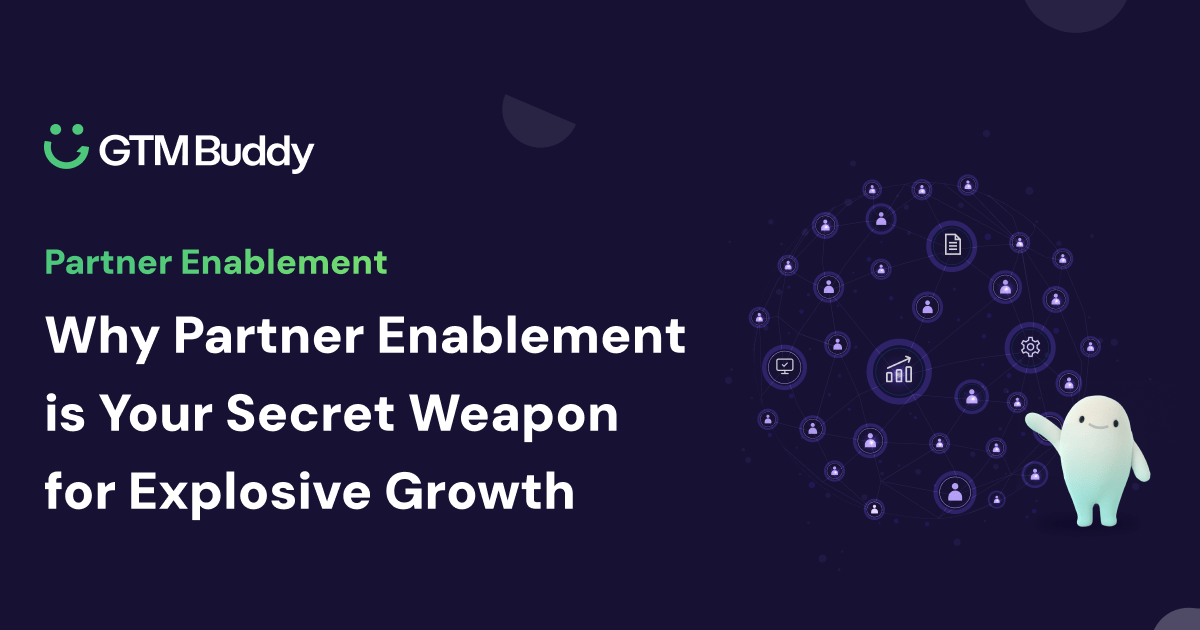By 2025, AI will not just support revenue enablement—it will redefine it. In a rapidly changing sales landscape, AI is transforming how teams execute strategies, foster cross-functional collaboration, and deliver hyper-personalized buyer experiences. However, its real potential lies in how it complements foundational pillars like leadership, execution, and collaboration.
This blog dives into how AI addresses critical challenges in enablement while providing actionable insights for teams preparing for the future. For a deeper exploration of these transformative trends, explore our whitepaper : Revenue Enablement Trends for 2025: Insights from CROs and Industry Leaders.
1. AI as the Catalyst for Closing the Execution Gap
Execution remains a top challenge for enablement teams. Misaligned priorities, conflicting goals, and lack of visibility often derail progress. AI provides the tools to bridge these gaps through real-time dashboards that unify cross-functional data, task automation, and actionable insights.
For example, leading organizations leverage AI-driven systems to monitor strategy execution in real time, identify bottlenecks, and course-correct. This level of visibility helps teams stay aligned with leadership priorities and ensures execution becomes a measurable, adaptable process.
How AI Fits: AI transforms execution by providing teams with centralized visibility, automating repetitive workflows, and surfacing strategic insights. However, achieving meaningful results still requires strong leadership to interpret data and drive cross-functional collaboration.
2. Personalization at Scale and Real-Time Coaching
Revenue enablement has always focused on providing the right resources at the right time. AI elevates this goal by enabling hyper-personalization and real-time coaching capabilities. For instance:
- AI tools analyze buyer behavior and recommend resources tailored to specific personas or deal stages.
- During live interactions, AI monitors conversations, flags disengagement, and suggests corrective actions to keep sellers on track.
These capabilities not only enhance seller efficiency but also allow them to dedicate more time to high-value, relationship-building activities. AI acts as an amplifier of human efforts, giving sellers the bandwidth to connect with buyers on a deeper level.
How AI Fits: By taking over routine tasks like CRM updates and data analysis, AI ensures sellers can focus on building authentic, high-impact relationships that drive long-term engagement.
3. Fostering Collaboration with AI
Cross-functional collaboration is vital for delivering seamless buyer experiences. However, many organizations struggle with siloed communication and inconsistent alignment between sales, marketing, and customer success teams.
AI helps by integrating data from disparate systems into shared platforms, aligning teams on metrics like customer lifetime value. Adaptive playbooks powered by AI provide real-time, role-specific guidance, ensuring everyone—from marketers to account managers—is working cohesively toward shared goals.
AI in Action: While AI tools facilitate collaboration by bridging data silos, the foundation of successful teamwork lies in building a culture of trust, open communication, and shared accountability.
4. Leadership in the Age of AI
AI empowers leaders by equipping them with predictive insights and real-time analytics, enabling them to address roadblocks proactively and inspire their teams. However, leadership remains fundamentally human: fostering trust, empathy, and vision.
In the age of AI, the role of leaders evolves from commanding tasks to mentoring teams. With AI handling data-heavy tasks, leaders can focus on coaching, motivating, and driving alignment across departments.
How AI Fits: Leadership in 2025 will require a balance of leveraging AI for strategic foresight and doubling down on human-centric skills like emotional intelligence and adaptability.
5. Measuring Enablement Impact with AI
One of AI’s most significant contributions to enablement is its ability to measure impact in real time. Metrics such as ramp times, win rates, and deal velocity can be tracked and analyzed automatically, enabling enablement teams to demonstrate their ROI to leadership.
AI goes further by identifying patterns and gaps, providing actionable insights for improving discovery, storytelling, and objection handling. These insights ensure teams are not only meeting targets but are equipped to refine their approach continuously.
How AI Fits: By automating measurement and surfacing key insights, AI helps enablement teams tie their efforts directly to revenue outcomes, securing buy-in from the C-suite.
Why AI is Just One Piece of the Puzzle
AI addresses many challenges in enablement, but it is not a standalone solution. True success lies in integrating AI with foundational elements like execution, collaboration, and leadership.
Challenges Beyond AI:
Modern enablement faces hurdles like role ambiguity, lack of executive buy-in, and resistance to change. For example, without clear definitions of responsibilities, teams risk falling into reactive patterns, diluting their impact. AI can support clarity by automating task tracking and ensuring alignment, but leadership must drive the strategic focus.
Additionally, driving adoption of enablement resources remains a critical challenge. AI-powered tools can only succeed if sellers trust and use them consistently. Overcoming this resistance requires tailored training programs and change management efforts led by enablement leaders.
The Future of Enablement:
By addressing these challenges with AI as a support mechanism—not a replacement—teams can position themselves as strategic drivers of business outcomes. Successful organizations in 2025 will combine the efficiency of AI with human expertise, creating a balanced approach to execution, collaboration, and leadership.
Drive Enablement Forward
AI is reshaping revenue enablement, but its success depends on how teams integrate it into broader strategies. From refining execution to enhancing collaboration and driving measurable outcomes, AI is a catalyst for innovation.
To prepare your team for the challenges and opportunities of 2025, explore our whitepaper. It’s packed with actionable insights and frameworks from leading CROs to help your organization thrive.
Download the whitepaper and lead your enablement strategy into the future.







